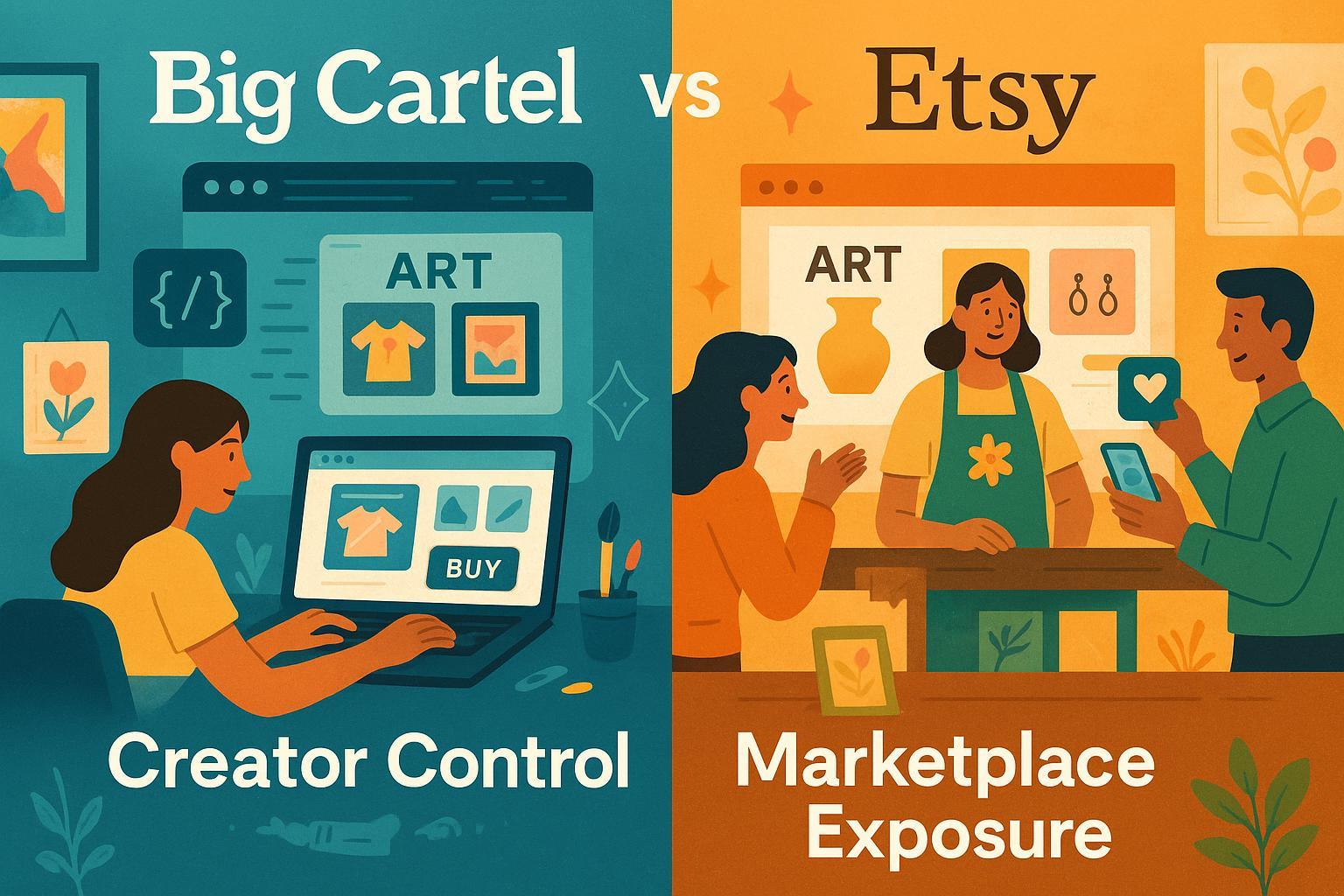Big Cartel vs Etsy: Where Should Creators Sell in 2024?
 Cover image: Big Cartel vs Etsy comparison, showing independent branded webstore versus large online marketplace for creators.
Cover image: Big Cartel vs Etsy comparison, showing independent branded webstore versus large online marketplace for creators.
Choosing where to sell your art, crafts, or designs can make or break your creative business. Should you launch a fully controlled independent shop with Big Cartel, or tap into Etsy’s massive buyer audience but surrender some autonomy? This guide breaks down the real tradeoffs—backed by data, real user feedback, and scenario-based recommendations—to help you decide: Big Cartel or Etsy?
At-a-Glance: Big Cartel vs Etsy Comparison Table
| Dimension | Big Cartel | Etsy |
|---|---|---|
| Ownership & Control | Full shop/site ownership; independent branding; seller controls policies, data, & design | Etsy owns/comanages storefront; limited shop data/branding; subject to platform rules |
| Customization/Flexibility | Full code and design flexibility (paid plans); custom domains; 17 themes; advanced template edits | Only limited template choices & listing visuals; Etsy branding dominates |
| Fees/Costs (per $20 order) | No platform commission; Stripe/PayPal fee (2.9%+$0.30 = $0.88); no listing/renewal fees | $0.20 listing + $1.30 (6.5%) transaction + $0.85 payment = $2.35+; optional ads 12-15% |
| Discoverability/Audience | Self-promotion required; no built-in traffic; artisan/niche shopper appeal | ~400M monthly visits; 8M+ sellers; high first-sale speed but intense competition |
| Onboarding/Ease of Use | Streamlined; owns checkout flow; code-free setup; import/export tools | Guided onboarding; ID verification; new seller setup fees ($15–$29); holds possible |
| Branding & Shop Design | Any branding, custom CSS/HTML on paid plans; full asset control | Minimal visual customisation; Etsy logo/UX prominent |
| Support & Community | Email support (M–F), responsive but limited depth; niche seller base | Large forums, Seller Handbook, peer support, Etsy Teams, robust help resources |
| Policies/Enforcement Risk | Seller determines terms; rare shop bans; less centralized policy enforcement | Strict enforcement, increased bans in 2024, policy disputes common |
1. Platform Ownership & Control
- Big Cartel gives you true ownership of your storefront, customer data, and brand presentation. Sellers set their own shop policies and enjoy much lower risk of sudden shutdown (“If you want ownership, start with Big Cartel”—Reddit, artbusiness). Customer relationships are direct, making it possible to collect emails, run analytics, and build loyalty over time.
- Etsy retains ultimate control. While you can personalize your storefront to a small degree, your business is always subject to marketplace rules. Account suspensions and listing removals can occur—and have spiked notably since 2024’s policy updates (source). Etsy controls shop visibility, marketing tools, and communications with your buyers.
Bottom Line: Big Cartel is better for creators seeking maximum control and direct customer relationships.
2. Customization & Flexibility
- Big Cartel: Paid plans unlock advanced theme editing (HTML/CSS/JS), custom domains, and asset management. Brand expression is as deep as you want it. Free plans are somewhat limited.
- Etsy: Shop sections and visuals are tightly prescribed. Major design, navigation, or checkout changes are not allowed; Etsy’s logo and platform UX dominate the shopper’s journey.
Scenario: If you want your brand—not a marketplace’s—to be at the center of your shop, Big Cartel wins.
3. Fee Structure & True Costs
- Big Cartel:
- Gold (Free, 5 products): $0/month.
- Platinum ($15/mo, 50 products) or Diamond ($30/mo, 500 products).
- No platform commission, only Stripe/PayPal rates (2.9% + $0.30/order).
- Sample $20 order: $0.88 in fees, seller nets ~$19.12.
- No listing, renewal, or forced ad fees.
- Etsy:
- $0.20 per listing, renewed every 4 months or on sale.
- 6.5% transaction fee (on total, incl. shipping).
- 3% + $0.25 payment processing fee.
- Sample $20 order: $2.35 in fees, seller nets $17.65 (excluding opt-in ad fees, which can deduct 12–15% more).
- New sellers: one-time onboarding/setup fee of $15–$29 reported in 2024 (source).
Fee Impact: Over time (especially as sales scale), Etsy’s cumulative platform and advertising fees cut more deeply into profits than Big Cartel’s single processing fee (see full simulation).
4. Marketplace Exposure & Discoverability
- Big Cartel: No built-in buyer audience; traffic comes from your own marketing, social channels, or niche collaborations. Time-to-first-sale is generally slower. However, you own all your customer relationships and email list.
- Etsy: Offers an audience of 95M–400M monthly visitors—unmatched for discovery, especially for new or less-marketed creators. First sale can happen quickly, but with 8M+ competing sellers, standing out for repeat sales is hard.
Best Fit: Etsy is better for creators who prioritize fast exposure and are willing to navigate competitive pressures. Big Cartel is ideal for those willing to build their brand and traffic more gradually in return for control.
5. Ease of Use & Onboarding
- Big Cartel: Sets up quickly. Code-free theme editing, automated tax tools, and integrations for print-on-demand or product reviews. You can import products from Etsy/Shopify. Checkout is fully under your control.
- Etsy: Guided onboarding process with ID verification. As of 2024, there is often a new seller setup fee ($15–$29, varies by user/location), and new accounts may face payment holds pending verification. Some users report friction with approval and slower support during setup.
Quotable: “Support staff is responsive, just not instant.” (Big Cartel, CrazyEgg)
6. Branding and Shop Design
- Big Cartel: Offers meaningful visual freedom—custom domains, HTML/CSS code access, and total asset control put your work front-and-center. Paid plans allow a professional, on-brand store image that can scale with your ambitions.
- Etsy: Shop banners, profile image, and some brand tone—but the shopper always knows they’re on Etsy. Your store can’t break free from Etsy’s design template.
7. Support & Community
- Big Cartel: Email-only support (8am-6pm EST, M–F). Reviews praise responsiveness for most issues, but large/studio-scale users may find limitations. Peer community is smaller, focused on independent creatives (source).
- Etsy: Robust Seller Handbook, active community forums, and Etsy Teams for collaboration. Peer-to-peer help, plus regular platform updates. However, support is sometimes critiqued for slow responses during disputes.
8. Platform Policies & Enforcement Risk
- Big Cartel: Your shop, your rules, within law and payment processor terms. Platform rarely bans or removes shops unless for egregious illegal activity. Most risk is self-managed.
- Etsy: Policy enforcement has intensified as of 2024. Seller disputes, forced policy changes, account holds, and even sudden closures occur. Sellers report unpredictability and stress—especially with the “Creativity Standards” enforcement (Reddit/Etsy forums).
Real Scenarios:
- Etsy: “They can close your shop with little warning.” (Etsy forums)
- Big Cartel: “No surprise takedowns, but you do need your own legal protections.” (Seller feedback)
Decision Matrix: Which Platform Fits Your Creative Business?
| Seller Type / Priority | Big Cartel | Etsy |
|---|---|---|
| Control/Brand-Driven Creator | Full control, owns customer & design | Limited; risk of platform overreach |
| Seeking Fast Exposure & Built-in Buyers | Gradual self-growth; no instant audience | Immediate exposure; huge audience |
| Scaling/Sustaining a Business | Best for long-term autonomy, data ownership | Scaling is possible, but fees and risk rise |
| Fee-Averse Seller | Minimal platform/processing fees | Many cumulative fees per order |
| Risk-Averse (Account Stability) | Low risk of sudden closure | Notable risk—account can be suspended |
| Community/Support-Focused | Niche, responsive support | Broad support, rich peer network |
Case Study: Going Beyond the Platform for Growth
Many successful creators combine both platforms—using Etsy for audience reach and Big Cartel as an owned, risk-resistant storefront. Advanced sellers boost their analytics and sales attribution with tools like Attribuly (ideal for Big Cartel power-users wanting deep marketing data, cross-channel tracking, and automated workflows).
Conclusion & Next Steps
Big Cartel is the best choice for creators who value full control, branding, minimal fees, and data ownership—and are willing to invest in their own audience and shop management. Etsy is unmatched for instant reach, but comes with higher fees and risk of sudden disruptions.
Tip: Consider starting on both: test Etsy for early sales and use Big Cartel as your long-term, independent home base. If you want to maximize the power of your owned store, Attribuly offers analytics, multi-touch attribution, and marketing automation to fuel your shop's growth with data-driven decisions.
Data sources: Big Cartel Pricing, Etsy Fees, StyleFactory Big Cartel Review, LinkMyBooks Etsy Fee Guide, MadeOnTheCommon Etsy Fees
Last updated: June 2024.
